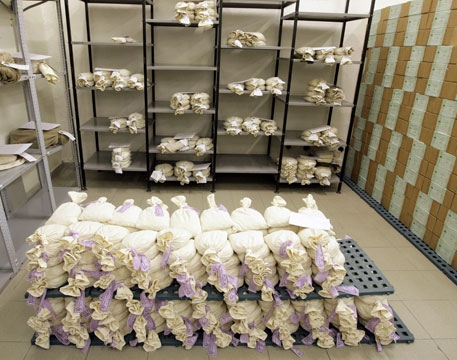Bank of Russia to replenish reserves only in case of meeting inflation target
The possibility of rebuilding the Central Bank's international reserves depends on the attainability of the inflation target, according to the bank's official Igor Dmitriev. Meanwhile, the inflation is slowing down faster than expected, so the regulator can consider a rate reduction at the board of directors' next meeting.
For the Russian Central Bank, a resumption of foreign currency purchases for reserves is conditional on meeting its inflation target, states Bloomberg. ''The main indicator the central bank will watch when making a decision to replenish reserves is the attainability of the inflation target,'' said Igor Dmitriev, the head of the bank's Monetary Policy Department, and added that ''there should certainly be some ''excessive'' supply of dollars on the market so that we can buy without any significant impact in general on the foreign-exchange market, without doing harm to achieving the target for inflation and keeping it at that level.''
At the moment, inflation in Russia is easing fast enough. Last month, it decreased to 4,6% from a year earlier, which is close to the Central Bank's target for 2017 of 4%. Seasonally adjusted monthly inflation fell to 0,1% in February from 0,3% in the previous month. ''These figures are clearly low, and for me that's a reason to suggest to the board of directors that it consider in March the possibility of a rate reduction among other options,'' said Dmitriev. The banker admitted the possibility of cutting the rate by 25 or 50 basis points as well as keeping it at the same level. However, there are numerous factors that can spur the inflation, such as risks from the oil market, the harvest's performance, the global food market. Thus, inflation expectations remain high.

The Bank of Russia's central repository. Photo: government.ru
The bank's plans to rebuild reserves are independent of foreign currency purchases that are currently performed by the Ministry of Finance to save an extra oil revenue.
According to the bank's policy guidelines for 2017-2019, international reserves at $500bn are ''appropriate for the stable functioning of the Russian economy in an unfavourable foreign economic environment and international trade and financial sanctions''. At the end of February, the reserves amounted to $397,3bn, still down a third from their 2008 peak. About a fifth of the stockpile was spent to support the ruble during the crisis of 2014. The last replenishment took place from May to July 2015 when the Central Bank bought about $10bn. After that, the regulator has suspended purchases and has pledged to avoid interventions unless the ruble's volatility threatens financial stability.